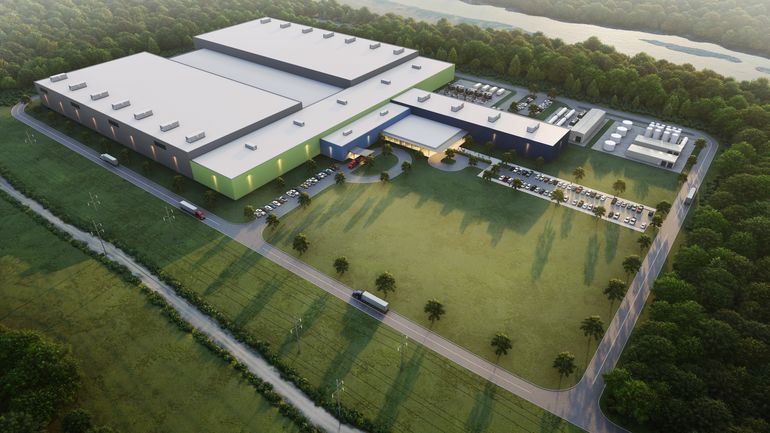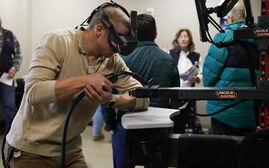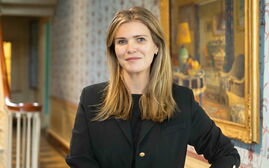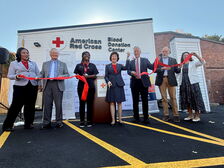With Millinocket proposal, salmon farming would head north
 Katahdin Salmon Inc.
Our Katahdin, an economic development nonprofit, said that Portland-based Katahdin Salmon has signed a lease within the industrial area of One North, the former Great Northern Paper mill site.
Katahdin Salmon Inc.
Our Katahdin, an economic development nonprofit, said that Portland-based Katahdin Salmon has signed a lease within the industrial area of One North, the former Great Northern Paper mill site.
A proposal is in the works for a land-based aquaculture operation in Millinocket that will produce 5,000 metric tons of Atlantic salmon.
Our Katahdin, an economic development nonprofit, said Thursday that Portland-based Katahdin Salmon has signed a lease within the industrial area of One North, the former Great Northern Paper mill site.
Pending approvals, the recirculating aquaculture system would supply fresh Atlantic salmon throughout the Northeast. At full capacity, the operation would create 80 full-time jobs.
“The arrival of Katahdin Salmon will be another exciting step toward the revitalization of the former Great Northern Paper mill site,” U.S. Sens. Susan Collins, R-Maine, and Angus King, I-Maine, said in a joint statement. “This state-of-the-art facility will raise Atlantic salmon in an environmentally sustainable way while creating dozens of new jobs. The real credit for this development goes to the people of the Katahdin region, who have worked tirelessly to strengthen the community and laid the foundation for future economic growth.”
Officials say the facility be run on renewable hydropower.
Nationally, salmon consumption is projected to reach 650,000 metric tons in 2023, according to Kontali, a salmon industry data provider. Market demand in the U.S. vastly outweighs domestic production. More than 90% of the fresh seafood consumed in the U.S. arrives by air freight.
Battles over land-based aquaculture
Proposals for farmed salmon and yellowfin operations have faced a contentious battle in other parts of Maine.
Efforts to build land-based aquafarming operations faced critics in Belfast, Bucksport and Jonesport, though those projects eventually moved forward.
On Frenchman Bay, critics said earlier this week that a proposal by American Aquafarms for a pen-based salmon farm warrants broader study.
The CEO of Katahdin Salmon says the firm has taken notice of opponents' views.
“We have been following the development of the RAS [recirculating aquaculture system] industry in the U.S. over the last 4 to 5 years, and we’ve listened carefully to the concerns expressed regarding aquaculture. We believe we have created a Maine-based company that is well-positioned to succeed in this industry and set a new standard for environmentally-friendly RAS aquaculture by using 100% renewable energy, reducing the water being discharged, recycling waste products on site, and moving the facility away from the coast,” said Marianne Naess, co-founder and CEO of Katahdin Salmon.
In contrast to ocean pen aquaculture, in a land-based recirculating aquaculture system the full life cycle of the salmon will be contained within the indoor facility, from eggs to harvest.
The Millinocket facility is compartmentalized to accommodate different stages of the salmon growth cycle, connected with pipes that allow the salmon to swim from one growth stage area to the next, thus reducing handling and increasing safety and well-being for the fish. Closed-system aquaculture eliminates the possibility of salmon escaping into local waterways and significantly increases fish health and biosecurity, Katahdin Salmon said.
Site preparation and the permit preparation and amendment process are underway. The company has agreed to locate the proposed facility on an EPA Brownfield area within the One North site and is working closely with the Our Katahdin team and both the federal Environmental Protection Agency brownfields and several bureaus within the state Department of Environmental Protection.
“We have prioritized communication with the community and other stakeholders. We have had conversations with business and community leaders in the Katahdin region, tribal and environmental groups, and elected officials. The feedback so far has been encouraging. This is a community that welcomes development,” said Naess.
While permits still need to be obtained, the project has supporters in both state and local government.
“This innovative project led by Katahdin Salmon will create good-paying jobs in the Katahdin region, and we are pleased to see it move forward,” said Heather Johnson, commissioner of the Maine Department of Economic and Community Development. "The economic benefits of aquaculture extend beyond the coast. Land-based projects support our rural economies, harness the potential of renewable energy, and support millions of dollars of economic value and thousands of jobs across the state.”
"This is a solid project and a fantastic opportunity for our community," said Peter Jamieson, Millinocket's town manager. "Katahdin Salmon has proposed a project that will bring good quality jobs to our region and rehabilitate key areas of the former mill site. It's a win-win for our town."
Our Katahdin, the owner of the 1,400-acre industrial property, is developing One North to expand the potential of Maine's bioeconomy by connecting local natural resources to increasing global demand for sustainable products. Land-based aquaculture production aligns with their vision of creating the highest value from Maine's available natural resources and has been a target industry for the organization.
“Aquaculture is a good fit for our industrial site. As world fish consumption continues to grow, aquaculture has emerged to meet demand and is a good option for expanding access to fresh fish locally and in regional seafood markets,” said Sean DeWitt, president of Our Katahdin.
Construction would create 100 to 120 jobs during the construction process, in addition to 80 full-time permanent jobs.














0 Comments